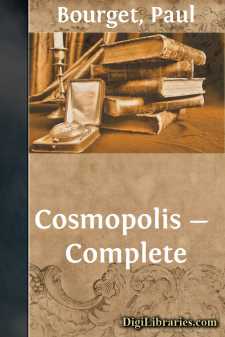Categories
- Antiques & Collectibles 13
- Architecture 36
- Art 48
- Bibles 22
- Biography & Autobiography 813
- Body, Mind & Spirit 142
- Business & Economics 28
- Children's Books 17
- Children's Fiction 14
- Computers 4
- Cooking 94
- Crafts & Hobbies 4
- Drama 346
- Education 46
- Family & Relationships 57
- Fiction 11829
- Games 19
- Gardening 17
- Health & Fitness 34
- History 1377
- House & Home 1
- Humor 147
- Juvenile Fiction 1873
- Juvenile Nonfiction 202
- Language Arts & Disciplines 88
- Law 16
- Literary Collections 686
- Literary Criticism 179
- Mathematics 13
- Medical 41
- Music 40
- Nature 179
- Non-Classifiable 1768
- Performing Arts 7
- Periodicals 1453
- Philosophy 64
- Photography 2
- Poetry 896
- Political Science 203
- Psychology 42
- Reference 154
- Religion 513
- Science 126
- Self-Help 84
- Social Science 81
- Sports & Recreation 34
- Study Aids 3
- Technology & Engineering 59
- Transportation 23
- Travel 463
- True Crime 29
Cosmopolis - Complete
by: Paul Bourget
Description:
Excerpt
PAUL BOURGET
Born in Amiens, September 2, 1852, Paul Bourget was a pupil at the Lycee Louis le Grand, and then followed a course at the Ecole des Hautes Etudes, intending to devote himself to Greek philology. He, however, soon gave up linguistics for poetry, literary criticism, and fiction. When yet a very young man, he became a contributor to various journals and reviews, among others to the 'Revue des deux Mondes, La Renaissance, Le Parlement, La Nouvelle Revue', etc. He has since given himself up almost exclusively to novels and fiction, but it is necessary to mention here that he also wrote poetry. His poetical works comprise: 'Poesies (1872-876), La Vie Inquiete (1875), Edel (1878), and Les Aveux (1882)'.
With riper mind and to far better advantage, he appeared a few years later in literary essays on the writers who had most influenced his own development—the philosophers Renan, Taine, and Amiel, the poets Baudelaire and Leconte de Lisle; the dramatist Dumas fils, and the novelists Turgenieff, the Goncourts, and Stendhal. Brunetiere says of Bourget that "no one knows more, has read more, read better, or meditated, more profoundly upon what he has read, or assimilated it more completely." So much "reading" and so much "meditation," even when accompanied by strong assimilative powers, are not, perhaps, the most desirable and necessary tendencies in a writer of verse or of fiction. To the philosophic critic, however, they must evidently be invaluable; and thus it is that in a certain self-allotted domain of literary appreciation allied to semi-scientific thought, Bourget stands to-day without a rival. His 'Essais de Psychologie Contemporaine (1883), Nouveaux Essais (1885), and Etudes et Portraits (1888)' are certainly not the work of a week, but rather the outcome of years of self-culture and of protracted determined endeavor upon the sternest lines. In fact, for a long time, Bourget rose at 3 a.m. and elaborated anxiously study after study, and sketch after sketch, well satisfied when he sometimes noticed his articles in the theatrical 'feuilleton' of the 'Globe' and the 'Parlement', until he finally contributed to the great 'Debats' itself. A period of long, hard, and painful probation must always be laid down, so to speak, as the foundation of subsequent literary fame. But France, fortunately for Bourget, is not one of those places where the foundation is likely to be laid in vain, or the period of probation to endure for ever and ever.
In fiction, Bourget carries realistic observation beyond the externals (which fixed the attention of Zola and Maupassant) to states of the mind: he unites the method of Stendhal to that of Balzac. He is always interesting and amusing. He takes himself seriously and persists in regarding the art of writing fiction as a science. He has wit, humor, charm, and lightness of touch, and ardently strives after philosophy and intellectuality—qualities that are rarely found in fiction. It may well be said of M. Bourget that he is innocent of the creation of a single stupid character....


